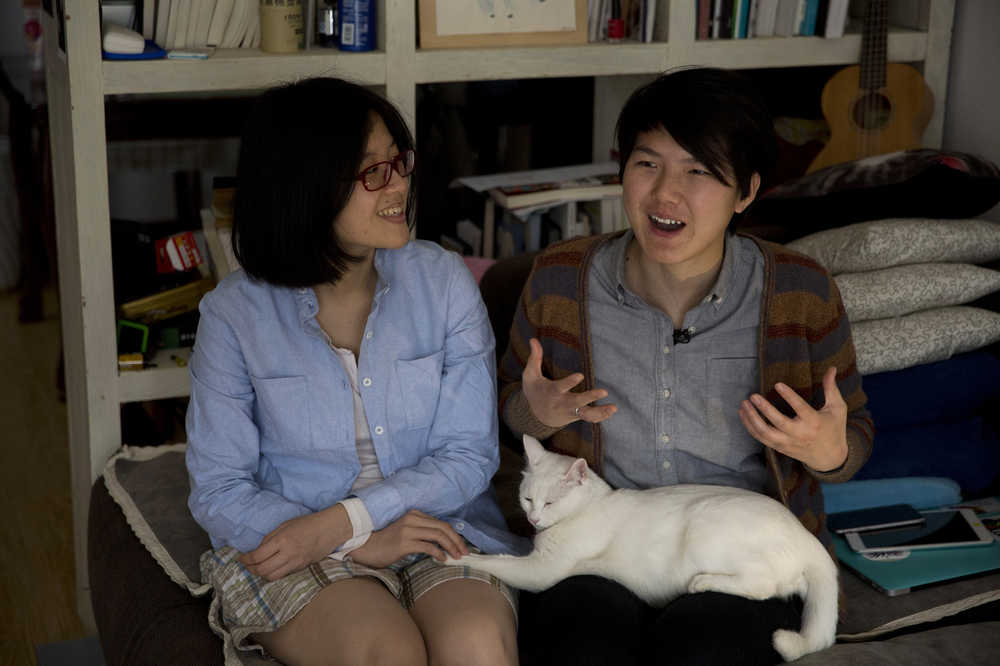BEIJING — Chinese women are being taken on a roller-coaster ride by social media, getting bombarded on one side by extreme expectations about physical beauty while getting support for female independence in a society where women who aren’t married by their late 20s are considered “leftovers.”
In recent months, social media here has been swept by a series of body image crazes. The “A4 waist” fad challenged women see how skinny they were by posting photos of their middles to show that a piece of standard copy paper 21 centimeters (8¼ inches) wide covered their waists.
Then “iPhone knees” tested whether a cellphone would cover the knees, an indication of slender legs. Most recently, the “100-yuan wrist” had women showing they could wrap a bank note around their wrists.
The online fads — slammed by women’s advocates as unhealthy and emotionally harmful to women who feel like they don’t measure up — come even as Chinese women are attaining higher educational, professional and economic status than ever. Yet as they try to break old barriers, women still feel pressure to meet cultural expectations about getting married in their early 20s, having children and being the main caregiver — as well as traditional notions equating slenderness with feminine beauty.
“Male-oriented aesthetics still dominate the mainstream, and the Internet or the new media have magnified this proclivity,” said Beijing-based social scholar Wu Qiang.
Taking the opposite tack — and also garnering lots of attention — has been a four-minute online ad by a cosmetics brand SK-II that depicts the struggles of unmarried women in their late 20s.
The video starts with several women talking in painful tones about the pressures they face from family and society. A few parents also appear, including one father who tells his daughter he won’t be able to go peacefully to his grave until she’s married off. But it ends with the women speaking confidently about their right to choose their way of life, including one who says she’s happy being single.
“The campaign really is to inspire women to overcome their limitations, to make their own destiny,” said Markus Strobel, global president for the cosmetic line, which is owned by Procter & Gamble Co.
Since being posted on the brand’s official microblog on April 7, the video has received nearly 5,000 likes and been shared more than 25,000 times. Altogether, the video has been viewed nearly 10 million times globally on all platforms, garnering more than 3.9 million comments, likes, shares and reposts, Strobel said.
The company chose to feature “leftover women” in China because it’s a topic much discussed, he said. All characters in the video — the women and their parents — are non-actors discussing their real-life struggles, he said.
Women’s rights activist Zheng Churan said she welcomed the ad despite its obvious commercial motives. Too often, however, the stereotype of the “leftover woman” ignores the struggles of poor, less-educated women, she said.
“We only see white-collar, elite women in this ad, but an 18-year-old factory girl pressed into marriage still has no voice,” Zheng said.
Fellow advocate Li Tingting said the popularity of the video is a sign that Chinese women have become more independent.
“It’s progress, compared to most other ads where women are expected to get married,” Li said. “The fact it has gone viral shows there have been changes in women’s attitudes.”
While seeking to empower women, the ad also speaks to how Chinese women have grown more conscious of their looks than ever. Workplace discrimination has frequently prompted women to undergo cosmetic surgery in hopes of gaining an edge in the job market, and in many cases, attracting a desirable husband.
Before the most recent body image crazes, the test to pass for being slender was whether a woman could wrap one of her arms around her back to reach her navel. Then came a test to see how many coins a woman could balance on her collarbone — supposedly to demonstrate a sculpted figure.
While women’s attitudes are changing, those of parents and society are taking much more time. The SK-II video depicts the Shanghai “marriage market,” where parents display information about their daughters in public parks in hopes of finding a suitor.
Zheng Lei, a 30-year-old Beijing man, said that while women have worked hard to become attractive, they also have become too picky and demanding.
“They demand the men to have money, houses, cars and urban residency permits. But there are only one thousand men who are able to meet this demand. Of course these women are left,” Zheng said. “So women should lower their demands and be realistic.”
___
Associated Press videojournalist Aritz Parra contributed to this report.

